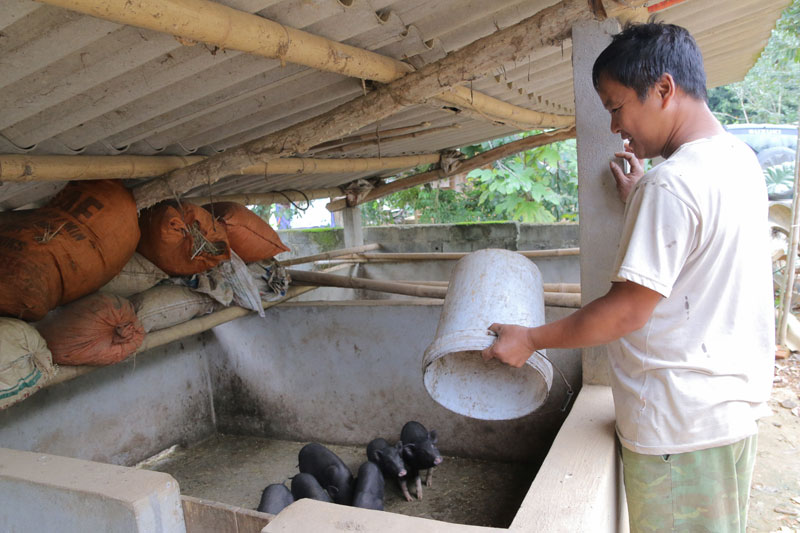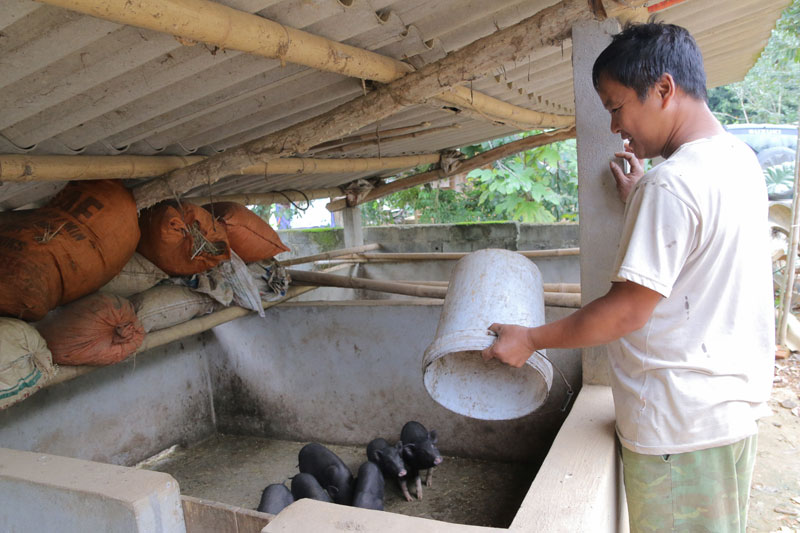
(HBO) – Over the past years, preferential loans provided by the Vietnam Bank for Social Policies (VBSP) have assisted farmers in Da Bac district in household economic development, thus helping to create jobs, raise income and improve living standards of rural residents.
 Thanks to soft loans of the VBSP, residents in Tam hamlet of
Cao Son commune (Da Bac district, Hoa Binh province) have developed animal
husbandry.
Thanks to soft loans of the VBSP, residents in Tam hamlet of
Cao Son commune (Da Bac district, Hoa Binh province) have developed animal
husbandry.
To facilitate locals’ access to preferential
credit, the VBSP branch in the district has actively coordinated with sectors
and organisations to boost communications to help people learn about lending
programmes and loan sources.
There are 244 savings and borrowing groups with
9,509 members across Da Bac at present. On average, every commune has 12
groups, each with 40 members. At those groups’ regular meetings, the VBSP’s
credit staff inform participants about capital growth, the rates of poor,
near-poor and policy beneficiary households eligible for borrowing, as well as
lending and loan disbursement procedures.
The bank has held meetings with local
authorities, organisations, and management boards of savings and borrowing
groups. At the same time, it has also provided training to help cadres and
residents further understand the VBSP’s activities and the Party and State’s
new preferential credit policies.
At present, the VBSP Da Bac branch is
implementing 14 preferential credit programmes with total outstanding loans
topping 354 billion VND (15.2 million USD) for 9,500 households. More than 99
percent of the credit is supplied in the form of entrusted loans via four
socio-political organisations. Aside from promoting verification to disburse
loans in a timely manner, the branch has also worked closely with associations,
organisations, and savings and borrowing groups to encourage people to use the
capital for right purposes effectively.
As a result, credit quality has been improved,
and the rate of overdue debts reduced to only 0.03 percent of total outstanding
loans. Almost 5.4 billion VND has also been deposited in savings accounts via
the bank’s communal transaction offices in Da Bac.
In 2019, 3,437 clients borrowed from the VBSP.
Preferential loans helped create jobs for 110 labourers, build 918 water supply
facilities and sanitary works in rural areas, and construct 133 houses for poor
families. They also served as a source of support for local students to enroll
in universities, colleges and vocational schools, and for 1,469 disadvantaged
ethnic minority households to develop production and business activities./.
According to data from the Hoa Binh Provincial Party Committee, the industrial production index for the first six months of 2025 is estimated to have increased by 20% compared to the same period last year. This marks the highest year-on-year growth rate for this period since 2020.
In the first six months of 2025, Hoa Binh province’s export turnover was estimated at 1.145 billion USD, marking an 18.11% increase compared to the same period in 2024. Import turnover was estimated at $ 804 million, a 17.15% increase, which helped the province maintain a positive trade balance.
The lives of the ethnic minority farmers in Tan Lac district have gradually improved thanks to the new directions in agricultural production. This is a testament to the collective strength fostered through the professional associations and groups implemented by various levels of the district’s Farmers’ Union.
With the motto the "product quality comes first,” after nearly one year of establishment and operation, Muong village’s Clean Food Agricultural and Commercial Cooperative, located in Cau Hamlet, Hung Son Commune (Kim Boi district), has launched reputable, high-quality agricultural products to the market that are well-received by consumers. The products such as Muong village’s pork sausage, salt-cured chicken, and salt-cured pork hocks have gradually carved out a place in the market and they are on the path to obtaining the OCOP certification.
In the past, the phrase "bumper harvest, rock-bottom prices" was a familiar refrain for Vietnamese farmers engaged in fragmented, small-scale agriculture. But today, a new spirit is emerging across rural areas of Hoa Binh province - one of collaboration, organisation, and collective economic models that provide a stable foundation for production.
Maintaining growing area codes and packing facility codes in accordance with regulations is a mandatory requirement for agricultural products to be eligible for export. Recently, the Department of Agriculture and Environment of Hoa Binh province has intensified technical supervision of designated farming areas and packing facilities to safeguard the "green passport" that enables its products to access international markets.



 Thanks to soft loans of the VBSP, residents in Tam hamlet of
Cao Son commune (Da Bac district, Hoa Binh province) have developed animal
husbandry.
Thanks to soft loans of the VBSP, residents in Tam hamlet of
Cao Son commune (Da Bac district, Hoa Binh province) have developed animal
husbandry.